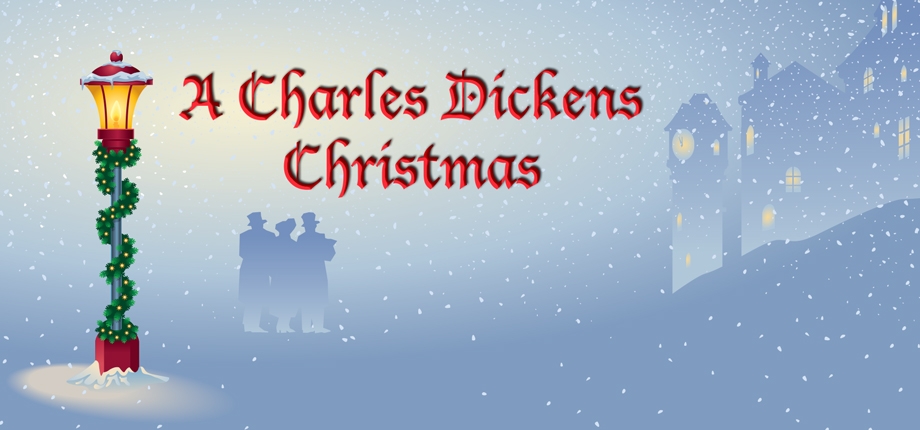The MTI office will close at 1 PM ET on Friday, May 23rd and remain closed through Monday, May 26th in observance of Memorial Day. Office operations will resume on Tuesday, May 27th.
Filichia Features: Charles Dickens Next Christmas?

Filichia Features: Charles Dickens Next Christmas?
This weekend or next, directors are probably closing their 2015 holiday musicals.
Only eleven months until the next one! And while you’re examining the tried-and-true holiday titles, may I suggest a fairly unknown one that needs to be brought to your attention?
You only need six actors to do it, although you could have more, because five performers play more than one role. The only person who stays in one character all night is, as you might have guessed, Charles Dickens himself. The others represent various friends, relatives and Londoners.
If it sounds daunting, be apprised that A Charles Dickens Christmas is only an hour long. Those of you who teach will find it ideal for school assemblies.
It would especially be good for English classes, for part of the show’s message is that writing doesn’t come easily even to the best of pros. And when we’re talking “best,” that category includes Charles Dickens, who in his day was already being touted as “the modern Shakespeare.”
Nevertheless, Charles struggles for almost the entire length of the show as he endeavors to conquer his severe case of writer’s block. Your students may feel a bit better about their own start-and-stop attempts to write when they see that even a literary giant doesn’t immediately come up with an idea for a story.
The show was Bruce Colville’s idea, but he enlisted Robert Owens Scott to pen the book, Douglas J. Cohen to compose the music and Tom Toce to write the lyrics. It’s been a big hit for TheatreworksUSA, one of the nation’s finest TYA purveyors.
We’re in London, of course, where Charles Dickens is putting the finishing touches on Oliver Twist. (Hey, wouldn’t THAT make a good musical … ?!) You’d think that Charles’ wrapping up a 438-page novel would be cause for celebration, but in devoting so much time to The Artful Dodger, Dickens has been dodging his other responsibility -- to write a Christmas story for his publisher.
‘Tis the season to be jolly, but Dickens shows great resistance to the upcoming holiday. “Christmas has never meant a thing to me!” he grouses. “I have no time for Christmas!”
Doesn’t he sound like a guy we know from literature whose initials are E.S.? Yes, but in a way, Charles is worse. Scrooge was mean to strangers on the street; Dickens is downright rude to a woman even after she establishes herself as a fan of his work. When she requests that he write about three orphans in her care, he rails at her and calls them “bedraggled little ragamuffins.”
We’d really hate him if we didn’t see him express remorse right away – well, not right away, for his apology is made to thin air after she’d immediately scurried away. But at least we see he’s sorry.
And if life isn’t hard enough, wouldn’t you know that Charles runs into his publisher? Here bookwriter Scott makes a very smart move: Dickens claims that he’s written the Christmas story and now all he has to do is copy it, but the publisher doesn’t believe him and baldly accuses him of lying. A lesser librettist would have had the publisher accept the story; this way, the stakes and the pressure are higher as the window of the holiday period is closing. Deadlines can be deadly, but they’re worse when, Dickens snarls, “one has to write about the most ridiculous of subjects: Christmas!”
At least his father is enjoying himself. John Dickens is seen in another part of town, living life to the fullest in a spirited number. “My son Charles owes his talent to me,” Dad sings, which, he insists, should be enough for his offspring to pay any debts which have arisen from his living high on the hog, turkey, lamb and Yorkshire pudding. Here’s where we see the irresponsible values that once led to John’s incarceration in debtors’ prison. (John and Elizabeth’s, to be technical, for wives were very wither-thou-goest then.)
So when John drops in on Charles, he doesn’t get even a lukewarm welcome. His struggles with the story remind Charles that “Every Christmas when I was a child, I got nothing.” That spurs his father to say “You’ve become a hard man, Charles.”
Once again, Charles regrets his outburst only seconds after he’s made it. But he can’t dwell on it too long, for there is that “jolly, happy Christmas story I must write,” he notes with a scowl on his face. “Why can’t I think of a silly Christmas story?”
We know the answer: Charles doesn’t believe in his subject, so he’s not going to create anything convincing about it. (The show gives English teachers the chance to pass this truth onto their students.)
Charles’ first attempt comes to life by having the show’s other five actors doing their part(s). Well, a writer IS supposed to make his characters come alive, so having them there to talk to him as well as to each other makes sense.
Dickens, too-frantic, whips up the story of a non-tiny Tim who works 15 hours a day. You’d think that putting in all that time would entitle him to a nice Christmas bonus, but a penny is all he gets. How can he bring his parents any kind of Christmas gift?
Luckily, a female flower seller takes pity on Tim and gives him a free rose. (Lucky for us, Cohen comes up with a glorious melody for a charming waltz: “Beautiful Flowers.”) Now that Tim has gift in hand, he’s able to go off confidently to where they live – in debtors’ prison. (Sound familiar?)
Imagine his surprise – and ours – when Mom castigates him for the gift. “You spent money you could have given to us?” she growls while narrowing her eyes to slits. We assume she’ll be assuaged when Tim tells her the flower didn’t cost him anything, but that only makes her ask why he didn’t sell it and give her the money.
“And that,” Dickens muses aloud, “is what happened to me.”
Yes, an experience such as that would keep anyone from cherishing Christmas. Even those of us who’ve had a flare-up or two with our families during the holidays probably never endured anything as awful as this.
So Charles tries writing a romantic story. A young man is desperately in love with a young woman, who’s “fond” of him and “flattered” by the attention. The young man lets her know that these words aren’t synonyms for passion, which causes her to respond point-blank “I cannot love you because you have no prospects.”
And the reason Charles wrote this line? “Because Maria once said it to me,” he says softly, mourning a lost love. Now he imagines her returning as – shall-we-say -- a ghost? Stories with ghosts DO do well, don’t they? (We can all think of a tale that has three of them, and it’s certainly flourished for the last 172 years.) So The Ghostly Figment of His Imagination will have a lot to say from now on.
Charles knows that “Christmas is a time when people want to forget their troubles.” So even though he returns to a story of a family in dire financial straits, he decides “to bring in one of those silly Christmas miracles. I’ll think of something happy if it kills me.”
Once again, if you have no respect for your subject, you’ll only come up with literary garbage. Charles in fact does: a doozy of a deus ex machina where a barrister suddenly shows up and announces the family is the beneficiary of a previously unexpected will. “Now they were the happiest family in London!” Charles says, and to prove it, he joins in the choreography that the other five are joyously enacting.
London’s literary critics famously gave a hard time to Dickens for writing HARD TIMES; what would they have thought of this little horror? The Ghostly Figment of his Imagination reminds him that “Money is not the answer to everything,” but Charles is quick to pooh-pooh THAT opinion: “That’s how the real world works.”
And yet, the morning after when Charles re-reads the story, he knows she’s right and that’s he’s fooled himself into thinking he’s written something worthwhile. He does, however, have a good excuse: “I never had a Christmas.”
So Charles has got to clear away the cobwebs and the sorrow. Doing so eventually frees him to create the property we (and many of our forebears before us) have known and loved. Librettist Scott takes pains to have a couple of scenes that remind us of ones in A Christmas Carol: Charles’ sudden and unexpectedly joyous interaction with his landlady mirrors Scrooge’s with his maid Mrs. Dilber. And when Charles visits his father, he gives every impression that he’s about to excoriate him but surprises him with an “I love you” – just as Scrooge pretends he’ll chew out Crachit and then becomes wonderfully sentimental and generous.
“I always thought that Christmas meant forgetting,” Charles says. “But it’s for giving.”
And at a recent performance at Urban Stages, that line brought me back to one of the show’s first lyrics. After the chorus came out and sang “Christmas is for giving; Christmas is for getting,” I wondered if they were actually singing “Christmas is forgiving; Christmas is forgetting”? Ah, that lyricist Tom Toce is a clever one! We can interpret it any we’d like, mixing and matching the words in and combination we’d care to do.
Of course, you can’t expect to have the star-power that A Charles Dickens Christmas had in this recent outing: Ryan Silverman (Charles), Tony Sheldon (John), Lisa O’Hare (The Ghost), Nancy Anderson (Elizabeth), Mickey Ryan (Tim) and Jay Frisby (assorted roles), all under Don Stephenson’s able direction. But God bless you, everyone, for considering A Charles Dickens Christmas as your 2016 holiday show.
You may e-mail Peter at pfilichia@aol.com. Check out his weekly column each Monday at www.broadwayselect.com, Tuesday at www.masterworksbroadway.com and Friday at www.kritzerland.com. His book The Great Parade: Broadway’s Astonishing, Never-To-Be Forgotten 1963-1964 Season is now available at www.amazon.com.

























